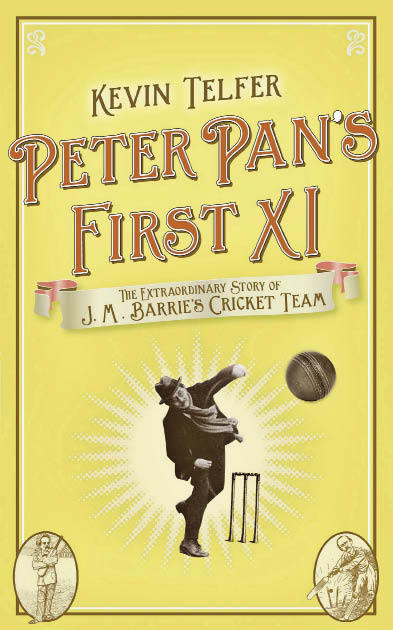The first game played by the Allahakbarries Cricket Club at Albury in Surrey in September 1887 did not bode well for the club’s future.
The first game played by the Allahakbarries Cricket Club at Albury in Surrey in September 1887 did not bode well for the club’s future. One player turned up wearing pyjamas, another held the bat the wrong way round while a third — a Frenchman — thought the game had finished every time the umpire called ‘Over’. The Allahakbarries were skittled out for just 11 runs and under the circumstances it seemed entirely appropriate that the team’s name should have been derived from the Moorish phrase for ‘Heaven Help Us’.
However, the team’s captain, the playwright, J. M. Barrie, was far from discouraged. For Barrie, cricket was about something far more important than winning or losing: it represented a return to a pastoral way of life, a world of childhood innocence, untouched by industry, urbanisation or other contemporary blights. In Barrie’s imagination, the line from Albury cricket ground stretched all the way to Neverland.
Over the next few years, the Allahakbarries may not have improved much — a description of another of their games records that ‘Mr Millet carried out his bat for a finely played 0’. However, the team attracted a remarkable collection of writers, actors and illustrators: Conan Doyle, A. A. Milne, Jerome K. Jerome, A. E. W. Mason, E. W. Hornung and P. G. Wodehouse all played for them, as did Gerald du Maurier, father of Daphne and the original Captain Hook in Peter Pan.
Conan Doyle was by far the best cricketer to have appeared in the Allahakbarrie colours. According to Barrie, he knew ‘a batman’s weakness by the colour of the mud on his shoes’. This, however, didn’t make him safe from mishaps. In 1904, Doyle met what must surely be one of the most bizarre fates ever to befall anyone on a cricket field when he was set on fire while batting. A ball hit him on the thigh and ignited the small tin of Vesta matches which he had unwisely put in his pocket.
A. E. W. Mason, author of The Four Feathers, was ‘a fast but somewhat erratic bowler’, while Barrie’s off-breaks were so slow that he claimed he was able to go and stand at mid-off after bowling a ball and wait until it arrived at the other end.
While all, or at least most, of the Allahakbarries seem to have suffered from some form of arrested development, Barrie’s had stalled forever somewhere around puberty. He was a tiny — five foot nothing — man possessed of a chirpily ebullient temperament and a habit of referring to cricket pitches as ‘swards’, and one gets the impression his head must have presented an irresistible target to any fast yet erratic bowlers on the opposing team. When his wife Mary left him for one of his best friends, she noted briskly, ‘J. M.’s tragedy was that he knew as a man he was a failure.’
This is a wonderful book, written with great elegance and affection, scrupulously researched and packed full of terrific stories. Here are all kinds of fascinating details — from the fact that Wodehouse got the name for Jeeves from the Warwickshire all-rounder, Percy Jeeves, to the revelation that Milne called his son Christopher Robin because he wanted him to play cricket for England, and thought two initials ‘would give him a more hopeful appearance on the scorecard’.
Once, in August 1900 in a game at Crystal Palace, Arthur Conan Doyle dismissed W. G. Grace — he had him caught behind after Grace tried to smash the ball out of the ground. David Kynaston’s WG’s Birthday Party, first published 20 years ago, fully deserves its reissue.
It doesn’t claim to be a definitive biography, but gives a crisp yet richly atmospheric account of the match at Lords in July 1898 to celebrate Grace’s 50th birthday. Like Barrie, Grace never really grew up: he had a squeaky voice which would rise to a dog-whistle pitch of indignation whenever an umpire had the temerity to give him out.
The match, which Grace’s team lost, did not signal the end of his career: he played his last game in 1914 aged 66. A year later, having suffered a stroke, Grace was greatly upset by the first Zeppelin raid on London. One of his friends, trying to cheer him up, said, ‘How can you mind the Zepps, WG, you who have played all the fastest bowlers of your time?’ ‘Ah,’ replied Grace sadly, ‘but I could see those beggars. I can’t see these.’






Comments